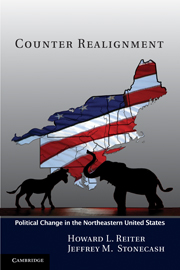Book contents
- Frontmatter
- Contents
- List of Figures
- List of Tables
- Preface
- Acknowledgments
- Postscript: Democratic Fortunes in the Northeast in 2010
- 1 Party Strategies and Transition in the Northeast
- 2 Party Pursuits and the Sources of Change
- 3 The First Republican Losses
- 4 Searching for a Majority, the Rise of Conservatives, and Second Losses
- 5 Interpreting the Goldwater Election and Pursuing the South
- 6 Social Change, Party Response, and Further Republican Losses
- 7 National Parties and the Position of the Northeast
- 8 The Process of Change and the Future
- Index
- References
7 - National Parties and the Position of the Northeast
Published online by Cambridge University Press: 05 June 2012
- Frontmatter
- Contents
- List of Figures
- List of Tables
- Preface
- Acknowledgments
- Postscript: Democratic Fortunes in the Northeast in 2010
- 1 Party Strategies and Transition in the Northeast
- 2 Party Pursuits and the Sources of Change
- 3 The First Republican Losses
- 4 Searching for a Majority, the Rise of Conservatives, and Second Losses
- 5 Interpreting the Goldwater Election and Pursuing the South
- 6 Social Change, Party Response, and Further Republican Losses
- 7 National Parties and the Position of the Northeast
- 8 The Process of Change and the Future
- Index
- References
Summary
There have been remarkable political changes within the nation over time, with the Republican Party coming to dominate the South and Democrats winning most of the Northeast. Republicans are now more conservative and Democrats are more liberal, each party has become more unified within Congress, and there has been an increase in party polarization. We have three concerns in this chapter. First, as changes took place, how have party representatives from the Northeast reacted? Have Republican Members of Congress adapted to their party or to their region? Second, how have these responses affected the national parties? Third, where have all these changes left the region relative to the rest of the nation?
Our focus is first on the voting in Congress, the arena in which members of the national parties assemble for legislative purposes. Congress is a very useful venue for tracking the behavior of regional representatives. It meets every year, it is comprised of members from every state, each party is amply represented in most years in both houses, and the Congress votes on numerous issues of high national importance. We then examine voting at national party conventions.
In answering the questions posed at the beginning of this chapter, we will first show that northeastern members of both parties in Congress were usually more liberal than political actors from other parts of the country.
- Type
- Chapter
- Information
- Counter RealignmentPolitical Change in the Northeastern United States, pp. 147 - 166Publisher: Cambridge University PressPrint publication year: 2011



